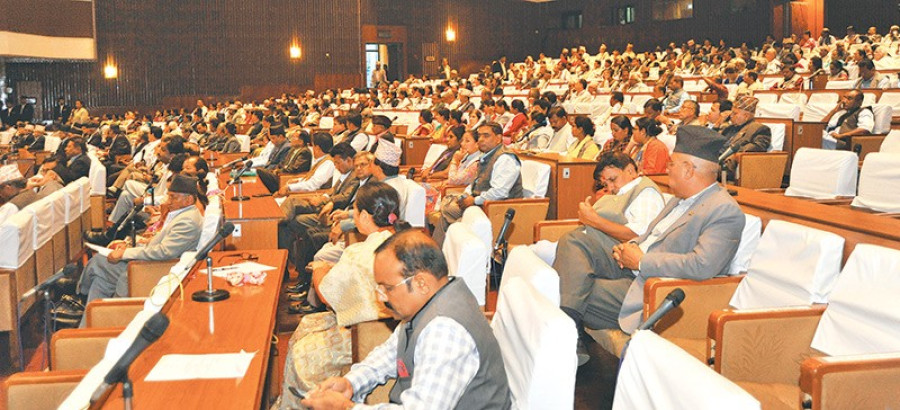National
Parliament prorogued without endorsing laws critical to federalism
Four years since constitution promulgation, the government has failed to endorse laws that are necessary for federalism to function as envisioned.
Binod Ghimire
The fourth session of the federal parliament was prorogued on Thursday without endorsing crucial laws necessary for both the federal and provincial governments to implement federalism as envisioned by the constitution fully.
The constitution, promulgated four years ago, authorises provincial governments to hire civil servants through provincial public service commissions once a federal civil service law is in place. But four years since the promulgation of the statute, the federal parliament has yet to endorse the law, preventing provincial commissions from hiring civil servants. Though the Federal Civil Service Bill has been tabled in Parliament, it has not been presented for deliberation.
The Federal Public Service Commission Bill is suffering the same fate. According to the constitution, provincial laws, including the civil service Act, should be in line with federal Acts. Provincial governments thus cannot draft their own Acts unless the federal Act is in place. But the central government, despite missing no opportunity to remind provincial governments of constitutional provisions, has itself hamstrung the federal process.
Legal analysts say that it is unfortunate that the government and Parliament have shown little urgency in endorsing federal Acts.
“All the federal laws needed to be in place, as we are marking the fourth anniversary of constitution promulgation,” Bipin Adhikari, former dean at Kathmandu University School of Law, told the Post. He said the federal parliament is yet to endorse 40 other Acts that are crucial to constitution implementation. The delay by the federal government has hampered the local and provincial governments in having their 15 and 22 Acts, respectively.
Though Parliament has endorsed a majority of Acts that had constitutional deadlines, it has failed to do the same with those that do not have such deadlines. Acts related to fundamental rights were readied within three years of constitution promulgation while Acts that are not in conformity with the constitution were amended within a year of the first meeting of the federal parliament.
But just because there is no deadline for federal Acts does not mean they can be postponed for eternity, said constitutional experts.
“This is an issue of political accountability. The provincial governments must show courage and place pressure on the federal government,” Purna Man Shakya, a professor at the Nepal Law Campus, told the Post. Along with legal provisions, the government must also ensure the necessary sources for their execution, he said.
Officials at the provincial governments say that the federal government and Parliament have been insensitive towards them. The delays in endorsing the Federal Civil Service Act, and amendments to the Citizenship Act and Forest Act have particularly affected the functioning of provincial governments.
The federal education and federal health Acts are two others that have not yet been readied.
“These laws had to be readied in the previous session itself,” Dipendra Jha, chief attorney for the Province 2 government, told the Post. “Neither the federal government nor the federal parliament is sensitive towards our concerns.”
Ganesh Datta Bhatta, professor of Law under Tribhuvan University, said while it is the responsibility of the government ensure that laws are readied in time as the ruling party commands a majority in Parliament, it is also the duty of the opposition to cooperate to this effect. Once the government prepares and presents a bill, it can be endorsed by a simple majority of the federal parliament.
The federal parliament has already completed four sessions since its first meeting on March 5 last year. According to the parliamentary secretariat, the House of Representatives held 65 meetings in the budget session, which commenced on April 29. In addition to the government’s policies and programmes and the national budget for the fiscal year 2019-20, the House endorsed 15 other bills.
A total of 17 bills were registered by the government in the concluded session while 19 others were backlogs from previous sessions. “Some bills are under consideration in different House committees for finalisation,” Speaker Krishna Bahadur Mahara said in the Lower House on Thursday.
Around half a dozen bills that the government introduced in the federal parliament have been controversial. The government had to withdraw an amendment bill to the Guthi Act following massive public outrage while the Media Council Bill, Information Technology Bill and bill on an amendment to the National Human Rights Commission, all of which have received criticism from various quarters, are still under consideration.




 10.12°C Kathmandu
10.12°C Kathmandu














